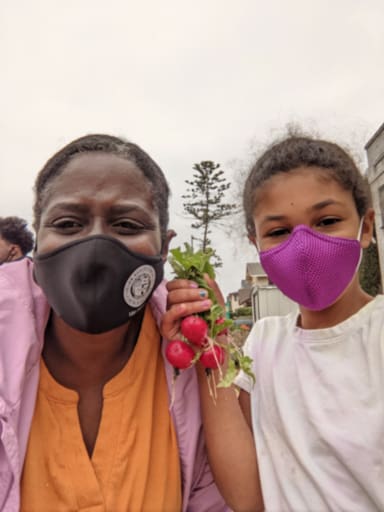Syntropy Healing and Research is a new fiscally sponsored program at Commonweal. In this article, Syntropy Founder and Director Rasheeda Hawk talks about her impulse to bring this work to the South Los Angeles neighborhoods where she grew up.
Science and Urban Farming in South Los Angeles
by Dr. Rasheeda Hawk, Program Manager, Syntropy Healing and Research
What makes us healthy?
What makes us ill?
In the 1990s, an international, collaborative research team came together to map and understand of all the genes of human beings. This effort, called the Human Genome Project (HGP), showed us that the genes that make up the blueprint of our beings are complex, dynamic, and nowhere near as predictable as once thought. This research highlighted another level of gene regulation, outside of the gene itself, that can change how our internal and external environments cause changes to our genetic make-up. This field of study, called epigenetics, looks at how our diets, pollutants, and even our behaviors can cause changes in the way our bodies “read” our DNA.
The discipline of epigenetics immediately caught my interest while I was working at Caltech. I focused my research on the study of physiological developmental disorders due to infections, toxins, and pollutants. At the University of Southern California, I continued this epigenetics research, looking at the breast cancer gene known as “braca.” From this research, I saw that the health disparities in breast cancer prevention, assessment, and treatment became very evident in the Black and Latinx communities.
In conversations with one of my mentors, Dedan Gills of Growing a Global Heart, he often spoke of the trans-generational traumas that show up in so many aspects of the lives of people of color. He would say, “We know the injuries, we know the trauma, but what does healing look like?” Those conversations helped to shape my research, and became the foundation of the work that I do in South Los Angeles—where I grew up and live.
My work has been at the intersection of science, education, and wellbeing, focusing on environmental factors that affect health, the well being of people from the physical down to the molecular levels, as well as the interface of the two. When we ask “what makes us healthy vs what makes us ill,” we are addressing what needs to be restored within ourselves, our relationships to each other, and our relationship to the earth.
I founded the organization Syntropy Healing and Research in 2016. Syntropy means lowering entropy “disorder” and making things whole and orderly, the process to wellness—a process we explore and address in our work in the communities in South Los Angeles. Our focus is on healthy food access, food sovereignty, and bioremediation of the soil found in “toxic hotspots” within South Los Angeles, especially children’s playgrounds.
Syntropy Health and Research currently has three programs: the Children’s Gardening Program, the Garden to the Farmers Market project, and Bioremediation of Toxic Hot Spots in South Los Angeles.
In our children’s gardening program, kids between the ages of 7-11 learn about ecosystems, environment, plants, and nutrition. Our garden program teaches children about the basic life systems of plants, but also about ecosystems and our connection to the environment. At the end of the 6-week programs, students have the tools to start a small garden at their home or they have the option to continue gardening with their parents at the community garden. This summer, we are including nutrition in our Children’s Gardening Program at the community garden in the historic West Adams district, so that children can learn about healthy food options and healthy alternatives. Since the closing of schools due to COVID-19, many parents want their children involved in activities that are not computer related—and they want safe places for children to play and learn.
In the Garden to the Farmer’s Market project, adolescents ages 13-17 in the Watts, Crenshaw, and West Adams neighborhoods offer fruits and vegetables grown at our garden to local farmers markets and food hubs in South Los Angeles.
In our bioremediation project, we’re looking at urban areas like South Los Angeles that are filled with toxic hot spots—locations where emissions of pollutants are elevated, and, as a result, expose the residents to elevated health risks such as cancer and other ailments. We are training a new generation of “community researchers,” who are learning how to carry out bioremediation projects using compost, with its natural consortium of microbes and vermiculture, to degrade toxins in the soil. This year, we will also use certain drought-resistant plants that are phytoremediators, removing toxins from the soil and air.
For more information about our programs and how to help, please contact me at rhawk@syntropyhealth.org. Our new website is under development, but should be available in mid-June at: syntropyhealing.org.
______
Dr. Rasheeda Hawk is the program manager for Syntropy Healing and Research. Rasheeda, a biophysicist who was raised in south central Los Angeles, works at the intersection of science, education, and well-being. Though most scientists look at the causes for the pathogenesis of diseases, Rasheeda’s research includes preventative and restorative measures towards health. Her research focus includes environmental factors that affect health, the well-being of people from the physical down to the molecular levels, and the interface of the two.
